SRMAP-TBI launches the first cohort of 36 start-up ventures
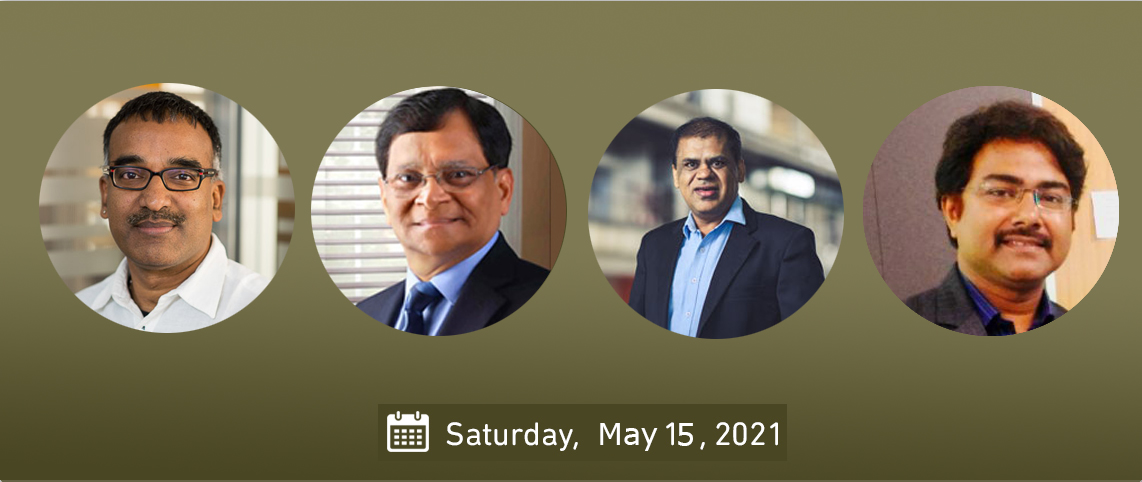
Technology Business Incubator of SRM University-AP launched the first venture cohort with 36 selected startup business ventures, on May 15, 2021, in the presence of the special guest of honour from industry, Prof Ramesh Loganathan, Head of co-innovation and outreach at IIIT Hyderabad and Ex-Chief Innovation Officer of the Telangana State Innovation Cell (TSIC).
“From the initial years onwards, SRM University-AP is focused to make entrepreneurs who can be the leaders of tomorrow. The University signed an MOU with the University of California, Berkeley to design the curriculum to promote entrepreneurship,” Said Prof V S Rao, Vice-Chancellor, SRM University-AP, in his welcome speech.
Advancing the proceedings of the event, the guest of honour Prof Ramesh Loganathan gave a brief understanding of the scope and future of entrepreneurship in India and the global scenario. “The entrepreneurial journey should start with identifying the problems in the ecosystem. A great example can be the face recognition software that started with the idea of capturing student attendance in colleges. Similarly, the budding entrepreneurs should identify such similar problems, do thorough market research and then prepare the business plan. The price of the product/idea should matter the last.”
SRM University-AP, Andhra Pradesh established the ‘Innovation, Design and Entrepreneurship Academy (IDEA)’ as part of the strategic alliance with UC Berkeley to create an academy combining their Sutardja Center for Entrepreneurship and Jacob Center of Design and Innovation to foster the culture of innovation, design and entrepreneurship among the students of all streams including engineering, liberal arts and sciences, and management. Dr Prakash Jadav, Associate Professor and Head of IDEA opined, “It is exciting to see so many students submitting their business ideas in the first business cohort. I am sure that with our guidance and mentorship, they all can reach new heights in setting up their ventures in the industry.”
62 teams, which comprises 192 students applied for the opportunity. After a rigorous screening and evaluation on various parameters like innovation, scalability and commercialization, only 36 teams/ ventures were selected to be a part of the SRM TBI’s first cohort.
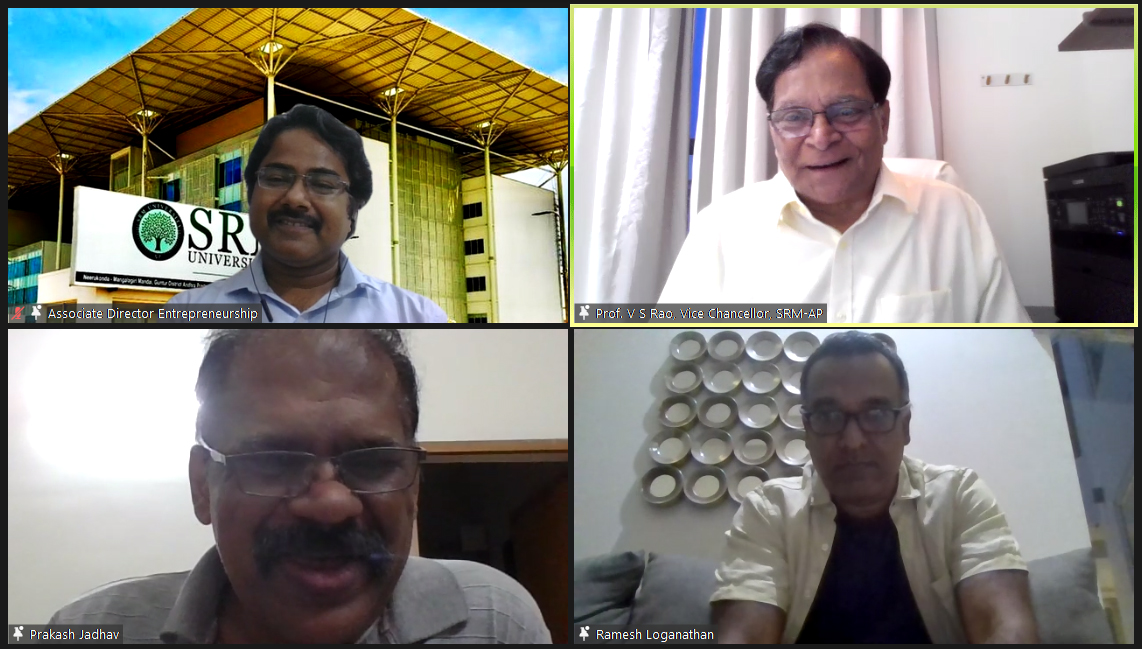 The selected ventures will be mentored and supported for a period of a minimum 12 months where they will be facilitated with infrastructure support, mentoring and networking support, seed fund and innovation fund support, hardware and software support, industry connectivity, learning resources, market exposure and several others.
The selected ventures will be mentored and supported for a period of a minimum 12 months where they will be facilitated with infrastructure support, mentoring and networking support, seed fund and innovation fund support, hardware and software support, industry connectivity, learning resources, market exposure and several others.
The selected ventures will be mentored and supported for a period of minimum 12 months will all the services of a regular technology business incubator. SRM TBI will also provide an opportunity to pitch to the investors, connects with industry experts, market linkage and a global network of mentors. The startups developing prototype and MVP can apply for the Product validation track and pre-revenue/ revenue stage startups can apply for the Market validation track. Each of the 36 startup ventures will get hands-on mentoring and guidance from the mentors and experts from their respective working areas. The startups go through physical interactions through contact sessions at SRM AP and virtual interaction with mentors through online workshops during the program.
After the Q & A session Mr Udayan Bakshi, CEO SRM TBI & Associate Director Entrepreneurship, cordially thanked all the speakers and panellists for their efforts to make the SRM TBI cohort launch a grand success. He also highlighted that TBI will not limit to just this batch of students or to the SRM University-AP, but shall extend its vision and activities to the entire ecosystem
Prediction of End-Time of COVID-19 Spread in AP
In the current pandemic situation, a pertinent question is an estimate of the time by which virus spread could be contained and normalcy would return. In this context,Prof.Narayana Rao, Pro Vice Chancellor, SRM University – AP initiated the study. Dr. Soumyajyoti Biswas of SRM University AP, along with 4 B.Tech Students have carried out an interesting study to predict the end time of COVID-19 spread in the state of Andhra Pradesh. The study employed Susceptible – Infected – Recovered (SIR) Model, making use of the information on the COVID-19 affected people and the recovered number of people, which the Government of AP makes it available through the control command center. SRM Team made use of this data, employed SIR Model and applied the methods of Machine Learning. Study reveals that by July 15th 2021, the rate of infection in AP will be below 100 per day.
With the assumption that the decay rate of infection is same as the growth rate, the model predicts that the number of infected people could be 10,000 (May 21), 15,000 (May 30), 1000 (June 14), 500 (June 23) and 100 (July 15)
The above report has been submitted to the Special Chief Secretary to the Hon’ble Chief Minister of Andhra Pradesh.
Media Panorama
- Published in News, Physics News, Research News
SRM University-AP & Titan Company Ltd collaborate to engineer novel gold alloys for contemporary jewellery
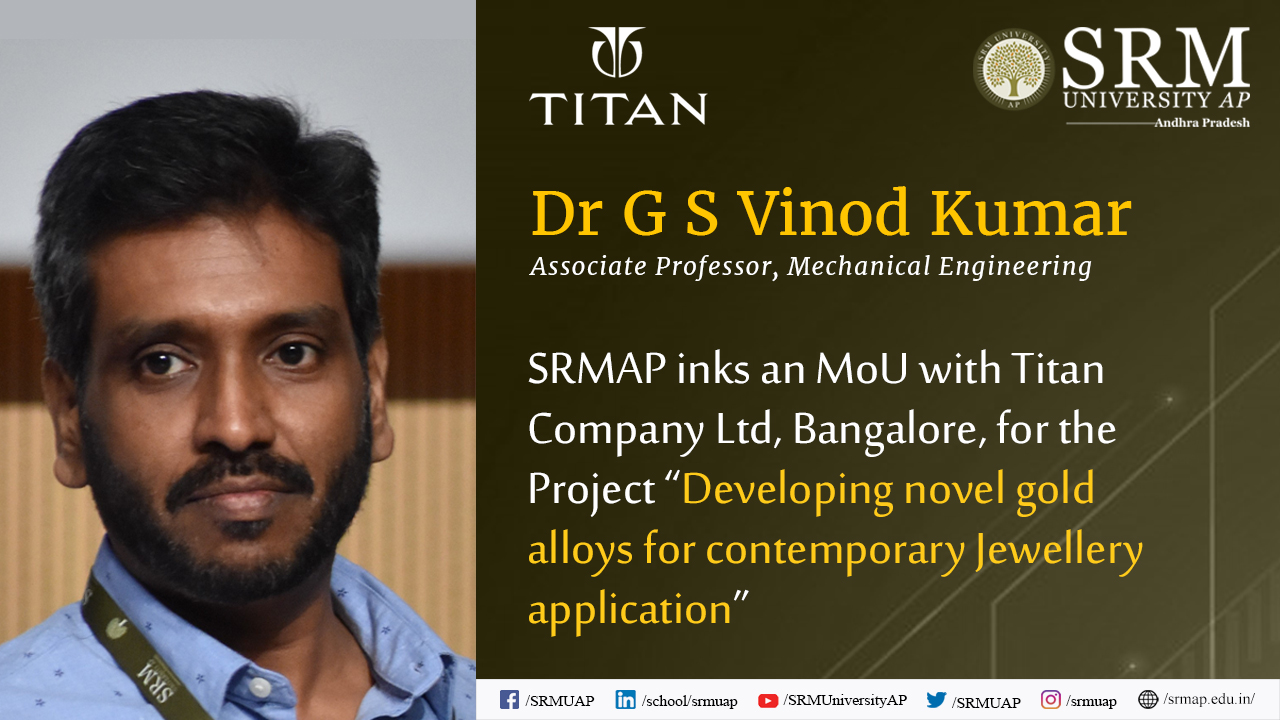 SRM University-AP inked an MOU with Titan Company Ltd (TATA group,) Bangalore, for the project “Developing novel gold alloys for contemporary Jewellery application”. Titan has sanctioned Rs. 29.6 lakhs for the execution of the project to Dr G S Vinod Kumar, Associate Professor in the Department of Mechanical Engineering and Principal Investigator of the project. Dr Vinod is well known for his research in precious metals such as gold and silver for making lightweight and high strength alloys that can be used in jewellery making.
SRM University-AP inked an MOU with Titan Company Ltd (TATA group,) Bangalore, for the project “Developing novel gold alloys for contemporary Jewellery application”. Titan has sanctioned Rs. 29.6 lakhs for the execution of the project to Dr G S Vinod Kumar, Associate Professor in the Department of Mechanical Engineering and Principal Investigator of the project. Dr Vinod is well known for his research in precious metals such as gold and silver for making lightweight and high strength alloys that can be used in jewellery making.
The jewellery division of Titan Company Ltd (TANISHQ) will jointly work on this project by supplying Gold for lab-scale experiments. The Industrial scaling up trials of the technology will be carried out at Titan’s jewellery manufacturing plant at Hosur, Tamil Nadu.
This is the fourth project sanctioned by Titan Company Ltd to Dr G S Vinod Kumar and the second project in Gold. The first project “Hardening of 22Karat and 24Karat gold for lightweight and high strength jewellery application” was successfully completed in 2018 by Dr Vinod and his team. A joint patent between SRM and Titan Company Ltd has been filed and the jewellery produced from hard 22Karat gold is currently available in Titan showrooms under the brand-TANISHQ.
- Published in Mechanical Engineering NEWS, News, Research News
Novel designs for electrochemical ammonia synthesis to substitute Haber-Bosch process
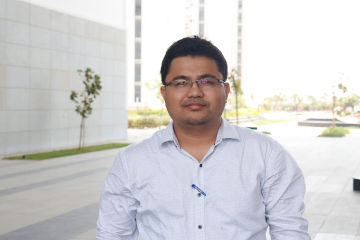 Professor Ranjit Thapa, Head of the Department of Physics, has recently published a paper “Unveiling the Genesis of the High Catalytic Activity in Nickel Phthalocyanine for Electrochemical Ammonia Synthesis” in the renowned Journal of Materials Chemistry A, Royal Society of Chemistry (Impact Factor: 11.301). The work has been done in collaboration with the Department of Industrial Chemistry & Applied Chemistry, Swami Vivekananda Research Centre, Ramakrishna Mission Vidyamandira, Belur Math, Howrah; Rubber Technology Centre, Indian Institute of Technology, Kharagpur; and Atomic & Molecular Physics Division, Bhabha Atomic Research Centre, Mumbai, India.
Professor Ranjit Thapa, Head of the Department of Physics, has recently published a paper “Unveiling the Genesis of the High Catalytic Activity in Nickel Phthalocyanine for Electrochemical Ammonia Synthesis” in the renowned Journal of Materials Chemistry A, Royal Society of Chemistry (Impact Factor: 11.301). The work has been done in collaboration with the Department of Industrial Chemistry & Applied Chemistry, Swami Vivekananda Research Centre, Ramakrishna Mission Vidyamandira, Belur Math, Howrah; Rubber Technology Centre, Indian Institute of Technology, Kharagpur; and Atomic & Molecular Physics Division, Bhabha Atomic Research Centre, Mumbai, India.
The slow kinetics of N2 adsorption, splitting of the strong N≡N bond are the challenges for the electrocatalytic nitrogen reduction reaction (NRR) process. In the electrocatalytic NRR process, the fast reaction kinetics of hydrogen evolution reaction is the greatest obstacle. To solve these challenges, the search for various types of catalysts is on a roll. Also, identifying active sites responsible for the origin of catalytic activity in transition metal phthalocyanine is difficult due to its complex structure. Herein, density functional theory (DFT) has been applied to identify the probable active sites of nickel phthalocyanine (NiPc) in NRR as well as the origin of catalytic activity, which is associated with d band centre and density of states (DOS) of Ni in NiPc. Accordingly, the NiPc nanorods (NRs) were synthesised by the solvothermal method on a large scale and the chemically prepared NiPc NRs exhibit the NH3 yield rate of about 85 μg h-1mgcat-1.
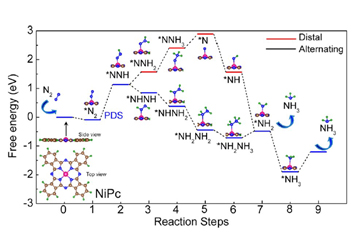 In 2019, the global production capacity of ammonia was 235 million metric tons which will increase to 290 million metric tons by 2030. This emphasis on ammonia is due to its application in broad and diverse fields, such as fertilisers, textiles, pharmaceutical, and carbon-free energy carriers. The Haber-Bosch process is used to synthesise ammonia (NH3) from N2 and H2 using Fe based catalyst. However, the process emits carbon dioxide (CO2) (1.5 tons of CO2/tons of NH3 production) and requires high pressure and temperature and consumes around 2% of the global energy supply. Electrocatalytic N2 fixation (N2 + 6H+ + 6e− → 2NH3) showed great potential due to the possible use of atmospheric nitrogen and hydrogen derived from water through electrolysis and in mild conditions.
In 2019, the global production capacity of ammonia was 235 million metric tons which will increase to 290 million metric tons by 2030. This emphasis on ammonia is due to its application in broad and diverse fields, such as fertilisers, textiles, pharmaceutical, and carbon-free energy carriers. The Haber-Bosch process is used to synthesise ammonia (NH3) from N2 and H2 using Fe based catalyst. However, the process emits carbon dioxide (CO2) (1.5 tons of CO2/tons of NH3 production) and requires high pressure and temperature and consumes around 2% of the global energy supply. Electrocatalytic N2 fixation (N2 + 6H+ + 6e− → 2NH3) showed great potential due to the possible use of atmospheric nitrogen and hydrogen derived from water through electrolysis and in mild conditions.
In their future endeavours, Prof Thapa and his research group will design different types of such single-atom catalyst (SAC) considering different metal atoms and their surrounding non-metals. Dr Thapa’s team necessitates addressing the above problem to fill the gap, which could be the energy equation, energy parameter and electronic descriptor, to help them predict the best SAC catalyst in the large catalyst space for eNRR over HER. The solution is much needed through density functional theory to understand the origin and design principle and lower the time for trials by experimentalists in the laboratory. Prof Thapa is working on energy equations that can predict the best catalyst for eNRR over HER. They defined four regions to find the SAC catalyst for eNRR over HER (1) catalyst for NRR with almost nil HER probability (ii) catalyst for NRR with low HER probability (iii) HER over NRR and (iv) NRR is possible but with H poisoning. Overall, the energy parameter and descriptor to find NRR over HER is a fundamental problem, and the database is a platform to be used by experimentalists and is the key idea.
Read the full paper: https://doi.org/10.1039/D1TA00766A.
- Published in News, Physics News, Research News






